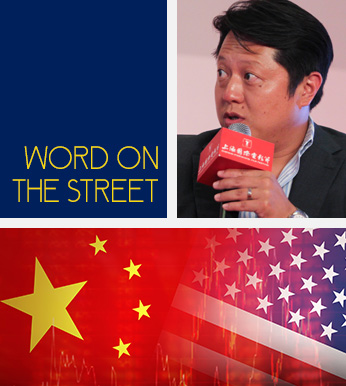Q&A with David U. Lee, Founder and CEO of Leeding Media
 WINSTON BAKER: What are some basic rules every Hollywood dealmaker should know before going into a deal with Chinese producers, executives and financiers?
WINSTON BAKER: What are some basic rules every Hollywood dealmaker should know before going into a deal with Chinese producers, executives and financiers?
DAVID U. LEE: The fundamental rules a Hollywood or non-Chinese executive or filmmaker should be aware of are somewhat universal, however, in China it runs a little deeper. On the surface, it is critical for the executive or filmmaker to do their due diligence about the Chinese company or executives who they are planning to work with. Therein lies the conundrum – how do you do your due diligence? You rely on the experience, reputation and expertise of an independent third party who has been doing business in both countries in the entertainment industry. The majority of Leeding Media’s business opportunities are based on referrals with companies that are looking to expand into the Chinese market and often already have a company they are working with, but don’t know much about them.
Find out whether they are in it for the long hall or are they a tourist type just trying to do one deal and see how things shake out. This is because the Chinese film business continues to grow, while many other industries, such as manufacturing, may not be expanding at the same rapid rate. To that end, the Chinese entertainment industry may attract many dealmakers from these other areas. Unfortunately, they may not be very adept at what they are doing, nor do they have deep-rooted relationships that are essential for success in the Chinese entertainment industry. They may try to exploit a window of opportunity and if a deal collapses, they simply move on and perhaps never do anything in entertainment again. It’s important to realize that similar situations occur in Hollywood whereby someone wants to try their hand at filmmaking and says they are a Producer and have a fantastic project that needs financing. The entertainment industry is one that is based on reputation and your CV — there may not be appropriate formal certificates that validates someone’s actual contribution in the film business. Therefore, once again, it is critical to secure a knowledgeable third party’s counsel in vetting the company whether it be Chinese, American, Italian or any other nationality.
WINSTON BAKER: Is it true that the “courting” process to gain trust with potential Chinese partners can take between 2-3 years? What happens within that time frame? Is there any way to shorten that process?
DAVID U. LEE: It is unwise to engage in business with someone new, regardless of what country they are from without first doing your due diligence. Potential Chinese partners are no exception and a good Chinese partner would not be looking to hastily get into business with you if you’ve not previously worked together. They usually take time to cultivate relationships and observe how you do business before making long term commitments. If they attempt to forge business dealings quickly, then there may be a hidden agenda you are unaware of.
Before working with anyone, especially on a long term, basis, you need to learn, and fully understand, how they do business. It can be tempting to want to engage in opportunities, but it’s advisable to be weary of anyone looking to fast track their business dealings with you. In China, you are only as good as your relationships, which means cultivating the strongest ones possible — this cannot be timed to any exact timeline, but from my experience, it takes many years. To shorten the process of working with a Chinese partner, look to be validated or endorsed by a trusted third party that may be a friend or business partner. This person can serve as an invaluable voice of reason should there be any misunderstandings.
WINSTON BAKER: Within China you control the rights to approximately 500 Hollywood hits such as Million Dollar Baby, Whiplash and Nightcrawler, how do you know which films will be successful in China? Are there certain elements you look for before bringing a film over?
DAVID U. LEE: While it is not a rule, and box office draw can always be unpredictable, moviegoers in China, generally speaking, are similar to audiences in the United States. Movies that are highly acclaimed or are popular at the box office in the U.S. tend to perform well in China too. That said, content is just part of the equation when it comes to a film having success in China, it is also crucial to work with the right partners. Leeding Media has the experience and expertise in bridging business opportunities between China and the U.S. and vice versa.
WINSTON BAKER: It appears that your company has been at the forefront of innovative digital ventures and new business opportunities in the entertainment industry between China and the United States – it’s clear that you have strong relationships, but how are you growing your business?
DAVID U. LEE: Leeding Media has a very unique niche and business model. It is a production, finance and marketing company that serves as a bridge between the U.S. and Chinese entertainment industries. We work with American studios, rights holders, filmmakers as well as Chinese investors, distributors and media companies. We also work with new market entrants — some with potentially disruptive business models, which are constantly driving growth and change. Leeding Media is diverse in its services, for example, we evaluate what the risk profiles are for both the Chinese and U.S. investors or clients; we articulate terms and conditions of potential deals to counter-parties so they can better understand each other’s needs and challenges; we assist in shaping the deal to keep it moving forward by suggesting solutions that result in win-win for all parties. Because we’ve been doing business on both sides in all these areas for over a decade, we approach and are approached for our expertise to develop and/or manage a variety of business ventures – this is what keeps our business growing.


